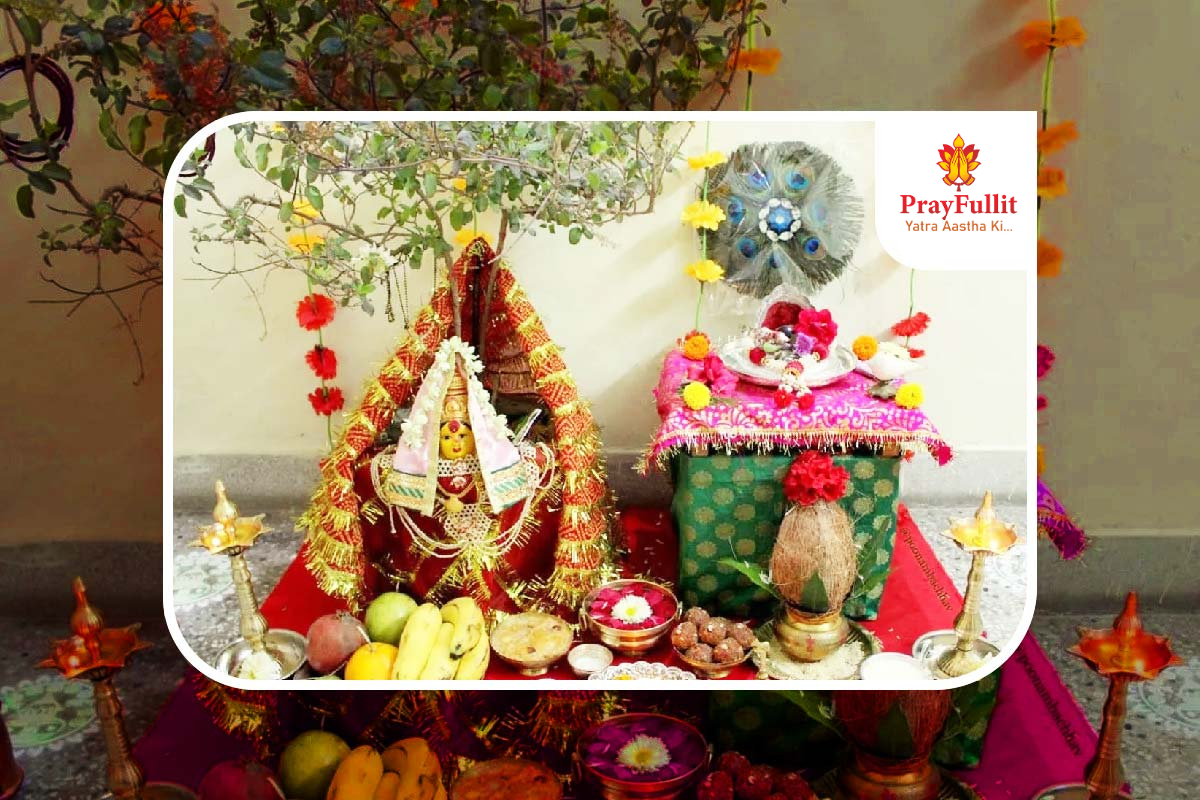Tulsi Vivah Pooja Online – Book Expert Pandits for Prosperity & Marital Bliss
Tulsi Vivah is the celestial wedding ceremony of the Tulsi plant (Holy Basil) to Lord Vishnu, often in his avatar as Lord Krishna or the Shaligram stone. Performed during the auspicious month of Kartika, this ritual marks the end of the monsoon and the beginning of the Hindu wedding season. Tulsi, the symbol of purity and devotion, is worshiped as the goddess Vrinda, and her union with Vishnu represents the merger of the earthly soul with the divine. Performing Tulsi Vivah at home is believed to bring the same merit (Punya) as performing a Kanyadaan, ensuring a happy married life and the removal of obstacles in finding a life partner.
At Prayfullit, we provide senior Vedic Pandits to conduct the authentic Tulsi Vivah ceremony. From decorating the Tulsi "bride" to performing the sacred Gathbandhan, our scholars ensure your home is filled with the divine vibrations of this holy union.
Key Benefits of Tulsi Vivah Pooja:
- Marital Harmony: Ensures a peaceful and prosperous relationship between husband and wife, removing discord and misunderstandings.
- Resolving Marriage Delays: Considered a supreme remedy for those facing delays or hurdles in getting married (Vivah Badha).
- Spiritual Purity: Invokes the healing and purifying energies of the Tulsi plant, which is known to cleanse the home’s aura.
- Prosperity & Progeny: Seeking the blessings of Lakshmi (manifested as Tulsi) and Vishnu for the overall growth and well-being of the family.
When is Tulsi Vivah Performed?
- Dev Uthani Ekadashi: The 11th day of the bright fortnight (Shukla Paksha) of Kartika. This is when Lord Vishnu wakes up from his four-month cosmic sleep (Chaturmas).
- Kartika Purnima: Many families also celebrate the wedding on the full moon day of the same month.
The Sacred Procedure: The Wedding of the Goddess Tulsi
Our Pandits follow the Shastra-based wedding protocols for Tulsi and Shaligram:
- Preparation of the Bride: The Tulsi plant is placed in a decorated pot, draped in a Red/Green Saree or Cloth, and adorned with jewelry, vermilion, and a nose ring.
- Sankalp: The devotee declares their intent to perform the marriage for the welfare of their family and the liberation of their ancestors.
- Shaligram/Krishna Pujan: The idol of Krishna or the Shaligram stone is bathed and dressed as the groom in traditional yellow attire.
- Vivah Vidhi: Varmala: Symbolic exchange of garlands between the Tulsi plant and the deity, Gathbandhan: Tying a sacred thread or cloth to join the plant and the idol & Mangal Pheras: Rotating the Shaligram around the Tulsi plant.
- Aarti & Bhog: Singing the Tulsi Aarti and offering seasonal fruits, sugarcane, sweet potato, and specially prepared sweets.
- Kanyadaan: The most emotional part of the ritual, where the devotee "gives away" Tulsi to Lord Vishnu, earning immense spiritual merit.
- Prasad Distribution: Sharing the blessed food with family and friends to celebrate the divine union.
Preparation Checklist for the Devotee
To ensure a beautiful ceremony, please organize the following:
- The Couple: A healthy Tulsi plant and an idol of Lord Krishna or a Shaligram stone.
- Wedding Items: A small red dupatta/saree, turmeric, vermilion (Kumkum), sacred thread (Mauli), and flower garlands.
- Special Foods: Sugarcane, amla (gooseberry), tamarind, and seasonal fruits that are traditional for this time of year.
- Mandap: A small canopy or arch decorated with marigolds and mango leaves to serve as the wedding venue.
Why Choose Prayfullit?
- Traditional Accuracy: We maintain the sanctity of the wedding rituals, treating the Tulsi plant with the same respect as a living bride.
- Expert Guidance: Our Pandits explain the spiritual significance of each step, from why sugarcane is used to the story of Goddess Vrinda.
- Holistic Support: We provide a complete list of items and can arrange for the Samagri kit to be delivered to your doorstep.
Book Your Tulsi Vivah Today with Prayfullit
Invite the Divine Couple into your home. Our expert Pandits perform the full Tulsi Vivah Ceremony, managing everything from the Shaligram Sthapana to the Varmala exchange, ensuring your family is blessed with the grace of Goddess Tulsi and Lord Krishna.
Download the Prayfullit App
Celebrate the divine wedding with the Prayfullit App. Book verified Pandits for Tulsi Vivah, receive Kartika Month ritual alerts, and access our "Tulsi Care & Worship" guide. Bring purity and prosperity to your doorstep with one click.
